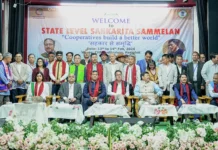NEW DELHI, 3 May: On World Press Freedom Day (WPFD) on Monday, the Indian Journalists Union (IJU) drew the union government’s urgent attention to the grim fact that over 100 journalists have lost their lives this past year, 45 alone in the second wave of the pandemic across the country.
In a letter to Prime Minister Narendra Modi and President Ram Nath Kovind, the IJU said that journalists are carrying out their duties, despite all odds, to have a better informed
public during this crisis, and its incumbent on the government to facilitate the functioning of the media, the fourth pillar of democracy, and declare the journalists too as frontline workers.
During an online meeting of the IJU’s member states, including the Northeast states, to observe WPFD, the IJU said the demand had been raised earlier but was not acted upon. “It is all the more relevant today,” it said, “as this year’s WPFD theme is ‘Information as a public good’ and “it serves as a call to affirm the importance of cherishing information as a public good, and exploring what can be done in the production, distribution and reception of content to strengthen journalism, and to advance transparency and empowerment while leaving no one behind.”
The IJU also said that “an advisory be issued that all journalists be given free vaccination and on a priority basis. Besides, an insurance scheme to cover journalists be announced as provided to frontline workers as they too are part and parcel of essential services.”
In a statement, IJU president Geetartha Pathak and secretary-general Sabina Inderjit reiterated the demand for a special safety law for journalists. “There is harassment and intimidation of journalists, arbitrary detentions, false cases under draconian laws such as sedition, the UAPA and the NSA, especially in the BJP-ruled states, particularly UP. Besides, there has been a steady downgrading of India’s press freedom index,” they said.
The IJU said it welcomes the Supreme Court’s direction that there shouldn’t be any clampdown on information as it would be treated as contempt of court.
“If citizens communicate their grievance on social media and the internet, it cannot be said it’s wrong information,” the court noted.


